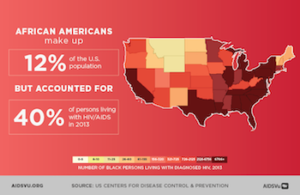
On World AIDS Day, the Registry briefly examines HIV/AIDS in African America.
Along with COVID-19, Blacks face what is perhaps as menacing a threat to our existence since slavery: AIDS. Public opinion is that the HIV/AIDS crisis is stabilizing, but that is not entirely true; it is getting worse for people of color. African Americans comprise 13% of the U.S. population and nearly 60% of those infected with HIV/AIDS. African American women are HIV 16 times more infected than White women, and almost 70% of the children infected with HIV/AIDS in this country are Black. The stigma HIV/AIDS carries in Black America has only increased since researchers became aware of the prominent role played by bisexual Black men in transmitting the virus.
Researchers had focused mainly on intravenous (needle-based) drug use, especially among women victims. The findings have highlighted the obscure world of gay and bisexual Black men who decline to openly acknowledge their sexual orientation and live dual lives of unsafe sexual behavior. Those risky actions were studied and presented at the 14th International AIDS Conference, which opened in Barcelona in 2002. Among the report's revelations was this: Many young gay men practicing risky sex believe they are unlikely to contract HIV. Among those with the virus, 90% of the Black men, 70% of the Latino men, and 60% of the White men did not know they were HIV positive.
Thus far, further response from Blacks is encouraging. Among African Americans who have not been tested for HIV, the reason given by most (40%) for not getting tested is that they are married or in a monogamous relationship. Another 25% say, "I'm not sexually active."
Epidemiological trends suggest strong reasons to be concerned about HIV infection among young African Americans. Black parents (68%) have grown increasingly worried about their children becoming infected with HIV--a concern they say has grown over the last few years. Like all Americans, Blacks have mixed feelings about how strong local community groups play a role in the fight against AIDS. About half (50%) of African Americans feel that local public schools and churches care "a lot" about the fight against AIDS; another 61% say local healthcare providers care a lot.
But "caring" doesn't always turn into "doing," according to African Americans. Only 40% see him--doing "a lot" in the fight against AIDS, while 25% of respondents think local public schools and community churches are actively helping.
The view among African Americans that nobody is doing much in the fight against AIDS is clearer regarding local, state, and federal governments. Very few Blacks think that the government at any level cares or does much in the fight against AIDS. Less than 25% of African Americans give the three government-level credit for caring a lot. Fewer than 20% say any government is doing a lot when assessing action.
Overall, African Americans expect more personal responsibility in their battle against AIDS but are not punitive in their views. Most feel strongly that individuals should take responsibility for safeguarding themselves from HIV infection. Of all African American adults, 84% agree that all adults should know how to protect themselves from HIV. Most say adults who become infected with HIV today should be held more personally responsible than those infected years ago (67%).
As of 2016, HIV remains a disproportionate risk to African Americans. Young African American gay and bisexual men account for more new HIV infections than any other group, and HIV affects African American heterosexual women more than women of any other race or ethnicity. More than 290,000 African Americans with stage 3 HIV (AIDS) have died since the start of the epidemic. Prevention efforts have led to encouraging decreases in HIV among African Americans, driven by steep declines among African American women. And, after years of troubling increases, infections have stabilized among African American gay and bisexual men.
The Black community does not want to minimize the threat of AIDS in Black Africa, perhaps one of the greatest threats to their existence.
African Americans continue to experience the most significant burden of HIV compared to other races and ethnicities in the United States. In 2017, African Americans accounted for 13% of the U.S. population but 43% (16,694) of the 38,739 new HIV diagnoses in the United States and dependent areas. Black/African American gay, bisexual, and other men who have sex with men are more affected by HIV than any other group in the United States.